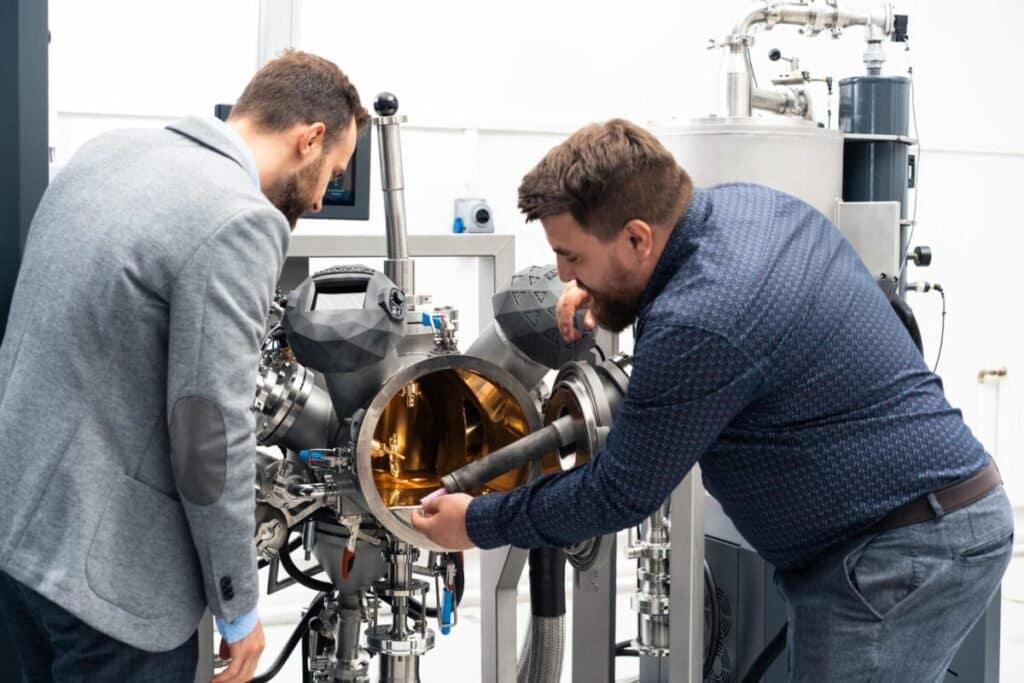Poland-based AMAZEMET makes laboratory-scale atomization equipment. The company, a Warsaw University of Technology spinoff, is now launching an on-demand atomization service. Meant for researchers and niche alloys, the service aims to help people make new materials.
AMAZEMET CEO Łukasz Żrodowski stated,
“We saw a clear challenge in materials innovation. Researchers with brilliant ideas were being held back by prohibitive costs and the inability to procure small, experimental batches of high-quality spherical powders. Our new service directly removes that barrier, enabling faster discovery and development.”
The company thinks that with its ultrasonic atomization offering, it can make small batches viably, in broader powder and morphology ranges. You can order from AMAZEMET starting at just €1,000, and the minimum powder quantity is 50 grams. Both seem to be very attractive numbers in terms of cost and quantity. This may lead some universities to be very tempted indeed, especially in the creation of emerging alloys or very experimental materials. The company says that up to 80% of feedstock becomes powder, and that they get oxygen levels of below 50 ppm; in some cases, even below 10 ppm. Powders range from 20 to 150μm, and while this varies, do not go beneath 10μm.
AMAZEMET says it has “expertise in processing highly reactive and high-temperature materials, including magnesium, titanium, rare earth elements (like Gadolinium), and refractory alloys.” Gadolinium oxide is used sparingly in additive as a neutron absorber, while it could also be used to get aluminum alloys with better creep strength, for example. On the whole, it’s exotic stuff for those bored with scandium. It’s good that they’ve done refractories, since there’s a lot of interest in materials such as niobium and molybdenum right now. AMAZEMET has also done HEAs, tin, lead, aluminum, Ti of course, bismuth, and God I wouldn’t want to be their health and safety manager. The company also has a lot of experience with reactive materials, which can be processed inertly. The firm also has a Powder2Powder technology for recycling metal powder that would otherwise be tossed, so scrap and costs could be reduced through this system. The company will share all process parameters with their clients and can arc melt alloys before atomization.
This is a smart play by AMAZEMET that should let many more industrial researchers and university departments try out the company. This could also be a good way to help the company find more clients. It could get a better picture of all the relevant research people worldwide, and then work on them to buy units. It could also get in ahead of new trendy materials. Are you interested in Hafnium? We already have the settings for that! More clients, and perhaps more mentions in research papers, could help them build their brand. I especially like the low quantities and affordable pricing. I really think that this is a particularly smart thing to do. Research projects never have enough money. By making it more affordable, you widen your net, and who knows, any one of those clients could hit it big with some European research project or similar.
Beyond the usual suspects, there are always materials companies entering the powder space. Many firms are curious as to if their material could find a place in additive. By making it cheaper to test new powders, AMAZEMET makes it easier for firms new to additive to introduce their powders, or just verify if they could work on an LPBF, EBM, or binder jet machine. Perhaps the company could also offer services to qualify, or at least determine the initial settings for, popular LPBF equipment. Or, it could work with Rosswag or Addimap to help new firms find parameters and test sites. I really think that it would be nice to say, “For $100,000 we’ll do the market research, give you parameters on the M290, do tensile and other testing, give you the relevant data, get you feedback from a user, and make you a powder.” That would be a very easy, very tempting way to help companies introduce a new powder to the market. I hope that they go on to do that, since anything that makes market entry easier will speed up the overall adoption of additive.



